
How Castor Oil Packs Can Help Support Menopause
Written by: Heather Tanti R.P.N (non-practicing)
Medically reviewed by: Victoria Williams R.H.N.
Est. reading time: 14 minutes
Picture this; you’re sipping your morning coffee, scrolling through endless to-dos for the day when, suddenly, a wave of warmth engulfs you, as if the sun decided to pay an unexpected visit.
Hello, menopause, a chapter in a woman’s life that introduces itself not with a knock, but with an undeniable ring of the doorbell.
As women, we often find ourselves on a rollercoaster of hormonal fluctuations, facing challenges that, at times, seem as unpredictable as the weather. Can you relate?
So, how do we weather this storm of change, and can Castor Oil Packs help? Let’s begin the journey together, starting with the fundamental question: What is menopause?
What is menopause?
If you’ve ever wondered why your once predictable body suddenly decides to throw a curveball or two, you’re not alone. Menopause, a term that often carries an air of uncertainty, is essentially your body’s way of announcing a profound change taking place. So, what exactly is it?
In the simplest terms, menopause marks the end of a woman’s reproductive years, signaling the finale of the menstrual cycle. Imagine it as a backstage crew slowly dimming the lights on a long-running production.
This natural biological process typically hits in the late 40s or early 50s, though it is known to make its entrance at its own pace, leaving each woman with a unique story to tell.
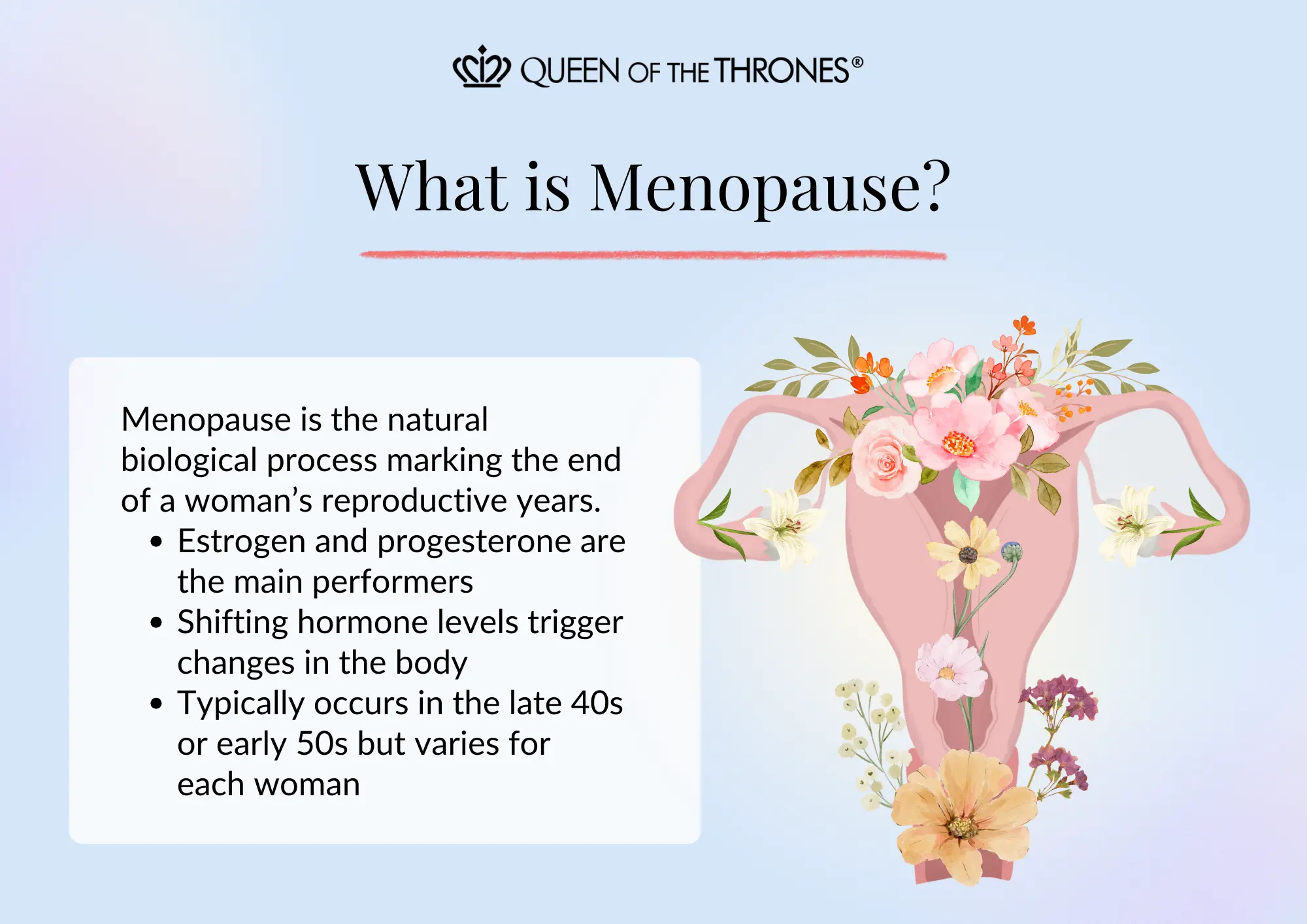
Menopause revolves around the intricate dance of hormones, with estrogen and progesterone as the main performers. As their levels shift, these reproductive key players send waves through your body, ushering in a mix of anticipated and unforeseen changes.
From hot flashes and mood swings, to a shift in your sleep patterns, menopause introduces a cast of characters that can make this journey both intriguing and challenging.
Now that we’ve pulled back the curtain on the essence of menopause, let’s delve into its various stages when it comes to navigating this transformative phase of a woman’s life.
Stages of menopause?
Concurrently, aging females experience a natural decrease in the ovarian egg count, resulting in a decline in fertility.2 The progression from perimenopause through menopause to post-menopause typically spans seven years or more.
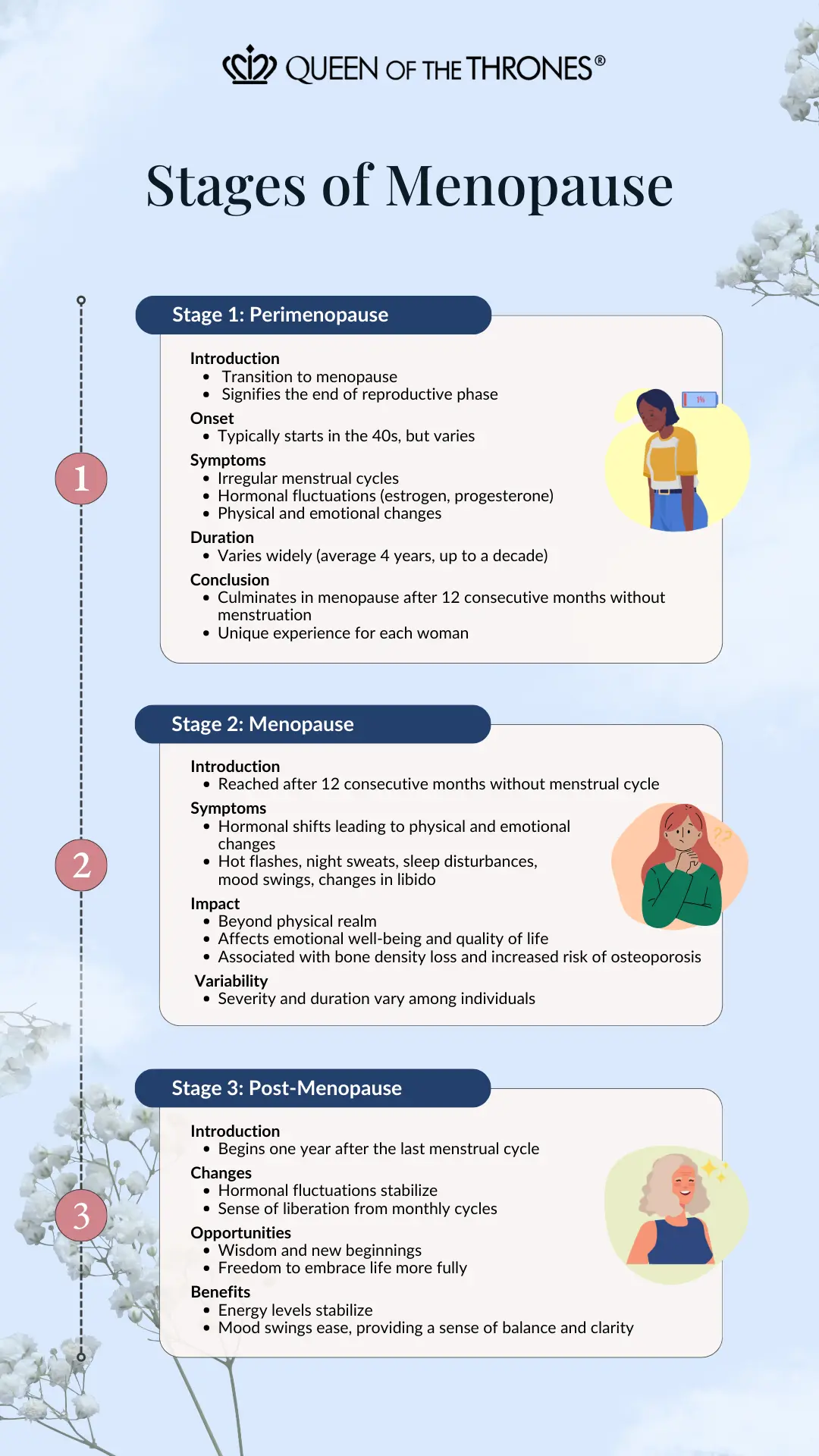
Stage 1: Perimenopause
Perimenopause serves as the bridge to menopause, signifying the conclusion of a woman’s reproductive phase. It commonly commences in a woman’s 40s, although its onset may vary, occurring earlier for some and later for others.
The hallmark of perimenopause is the irregularity of menstrual cycles, with periods becoming unpredictable in terms of timing and flow. Hormones such as estrogen and progesterone fluctuate during this period, leading to a range of physical and emotional symptoms. Hot flashes, night sweats, mood swings, and changes in libido are common experiences.
The duration of perimenopause varies widely among individuals, lasting an average of four years but extending up to a decade in some cases. It culminates in menopause, officially marked by 12 consecutive months without menstruation. The journey through perimenopause is unique for each woman, and the symptoms can range from mild to severe.
Stage 2: Menopause
These hormonal shifts contribute to a range of physical and emotional symptoms. Common symptoms include hot flashes, night sweats, sleep disturbances, mood swings, and changes in libido. The severity and duration of these symptoms can vary, and some women may experience them more intensely than others.
The impact of menopause extends beyond the physical realm, affecting emotional well-being and overall quality of life. Changes in hormone levels can contribute to mood swings, irritability, and feelings of fatigue. Additionally, the decline in estrogen levels during menopause is associated with bone density loss, potentially leading to an increased risk of osteoporosis.4
Stage 3: Post-Menopause
The hormonal fluctuations that once orchestrated the intricate dance of the menstrual cycle have settled into a steadier rhythm, offering a sense of liberation from the monthly ebb and flow.
Post-menopause is typically thought to begin one year after the last menstrual cycle5, bringing with it a certain wisdom and a unique set of opportunities. No longer navigating the uncertainties of monthly cycles, women often find a newfound freedom to embrace life more fully.
Energy levels stabilize, and the unpredictable mood swings tend to ease, allowing for a sense of balance and clarity.
Signs/Symptoms of menopause
Alright, let’s talk about the telltale signs your body might be dropping that menopause is making itself at home.
Think of it as your body’s way of sending postcards from this transformative journey.
Menopause hot flashes
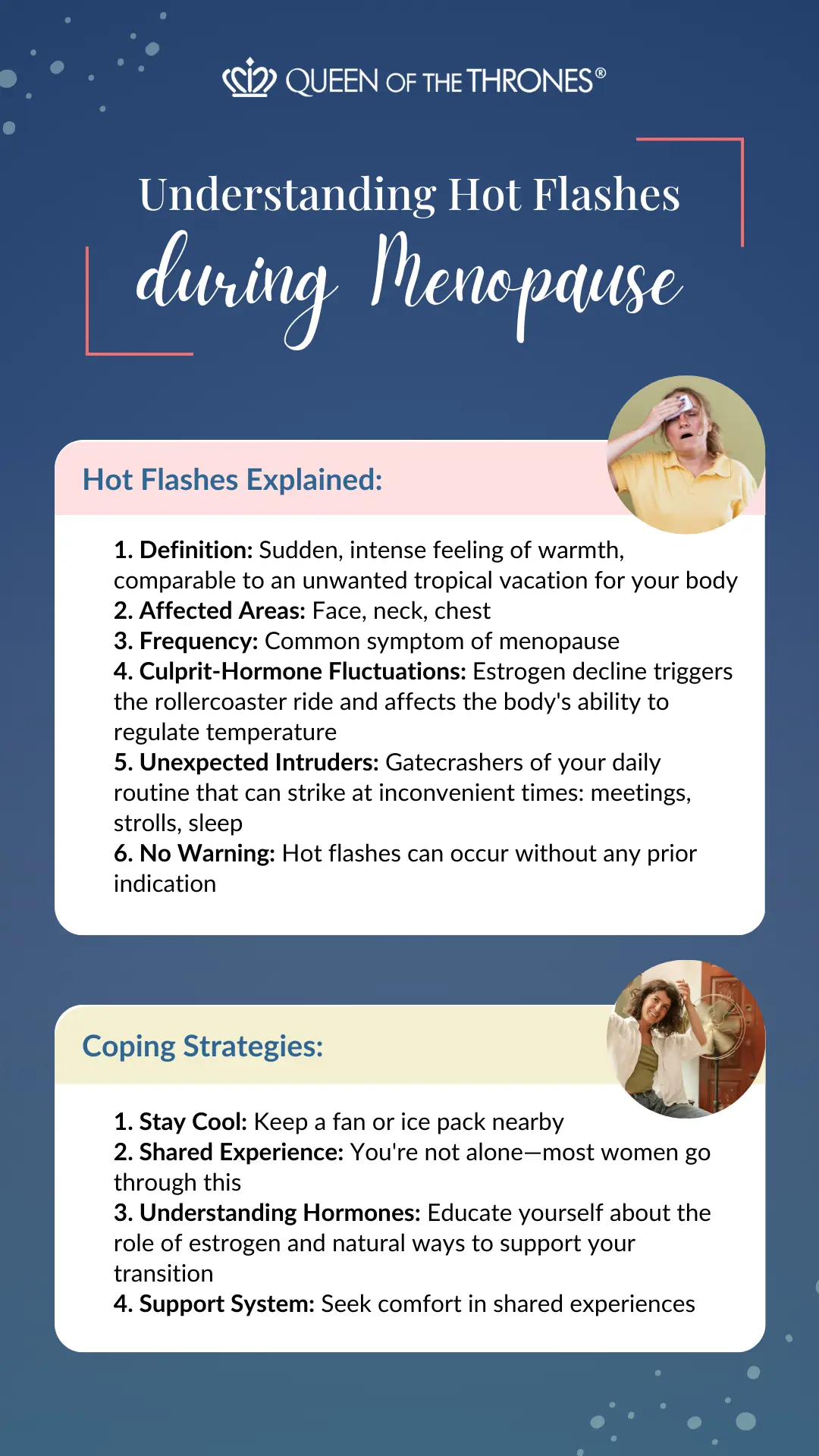
Hot flashes, a common symptom of menopause that leaves women feeling like their internal thermostat has a mind of its own. If you’re reading this and finding solace in shared experiences, you’re not alone.
What is a hot flash? It’s your body’s way of giving you an unwanted tropical vacation in the middle of your day. An abrupt intense feeling of warmth that can spread across your face, neck and chest.
What’s worse, hot flashes are like the gatecrashers of your daily routine, showing up at the most inconvenient times. Whether you’re in a meeting, enjoying a leisurely stroll, or catching some z’s, hot flashes can strike without warning.
The culprit? Hormone fluctuations. The decline of estrogen brings you on a rollercoaster ride that messes with your body’s ability to regulate temperature, leading to the sudden bursts of warmth that leave you racing for the nearest fan or ice pack. Can you relate?
Now that we’ve shed light on the fiery world of hot flashes, let’s explore another common menopausal companion- fatigue.
Menopause fatigue
If you’ve ever found yourself daydreaming about your bed in the middle of the day, or wondering why the energizer bunny seems to have abandoned you, you might be experiencing the uninvited guest known as menopause fatigue.
Picture this: You wake up after getting a full night’s sleep, only to find yourself battling a seemingly insurmountable force- fatigue that creeps into your bones, and colors your day with an unexpected shade of weariness.
Don’t feel bad though, menopause fatigue is not your typical tiredness; it’s a persistent, sometimes overwhelming sense of low energy that leaves you yearning for a nap at any given moment.
Why does this happen? Well, like many other menopausal symptoms, hormones take center stage in the fatigue department. Fluctuating levels of estrogen and progesterone can disrupt your sleep patterns, leaving you with restless nights and groggy mornings.
These hormone fluctuations can throw your energy levels into disarray, turning everyday activities into energy-draining challenges.
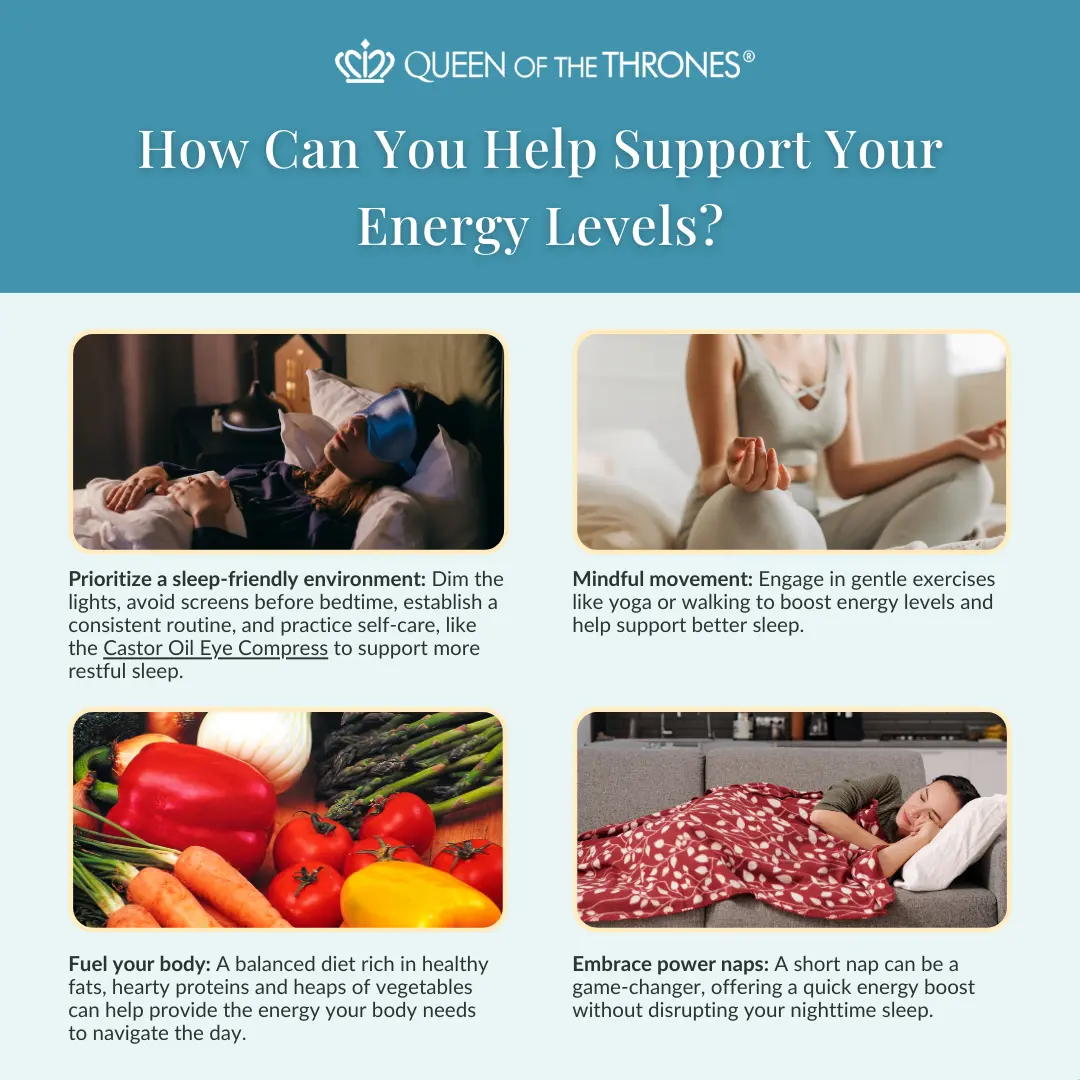
How can you help support your energy levels?
1. Prioritize a sleep-friendly environment: Dim the lights, avoid screens before bedtime, establish a consistent routine, and practice self-care, like the Castor Oil Eye Compress to support more restful sleep.
2. Mindful movement: Engage in gentle exercises like yoga or walking to boost energy levels, and help support better sleep.
3. Fuel your body: A balanced diet rich in healthy fats, hearty proteins and heaps of vegetables can help provide the energy your body needs to navigate the day.
4. Embrace power naps: A short nap can be a game-changer, offering a quick energy boost without disrupting your nighttime sleep.
Remember, it’s okay to acknowledge the fatigue, take a moment to recharge, and embrace the journey with resilience.
Menopause headaches
If you’ve ever found yourself grappling with head pain that seems to have joined the hormonal parade happening within your body, you’re not alone. Menopause can bring about changes in hormones that, in turn, affect blood vessels and neurotransmitters in your brain.
The result? Headaches that range from subtle pulsations, to down right pounding and painful. It’s like your head is trying to communicate with you in morse code. Sound familiar?
Estrogen, the hormone leader, plays a significant role in regulating blood vessels. As its levels dip and dance in unpredictable patterns, the blood vessels may react by constricting and dilating, triggering headaches.
Much like other menopause symptoms, headaches have an impeccable sense of timing. They often surface during or before your menstrual cycle, and for some women, they become frequent visitors during the menopausal transition
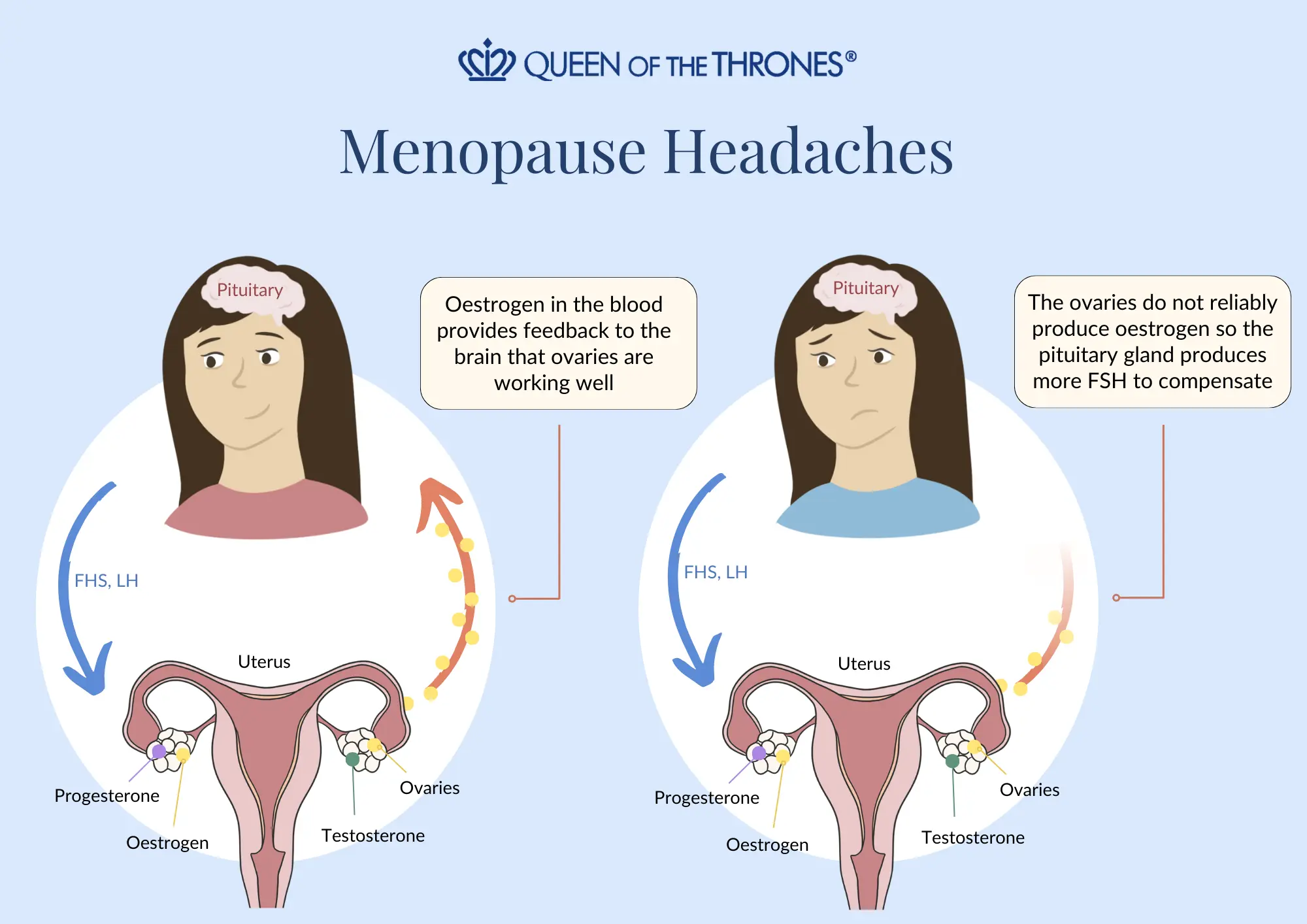
While menopause headaches might feel like an unwelcome hitchhiker on your journey through this phase of life, understanding their origins and practicing self-care strategies can help you navigate this aspect with grace.
Looking for a simple, natural way to support your headaches, and practice self-care? Try the Mystic Meditation Mask, a soft, cozy eye mask with studded beads that align with your acupressure points, helping to relieve tension, encourage mindfulness, and help you relax.
Menopause hair loss
Let’s shed some light on a topic that many find close to the roots- literally. Menopause and hair loss, an unexpected dance between your hormones and your hair.
Picture this: You’re going about your day when you notice more strands than usual in your hair brush, or scattered across the bathroom floor. Menopause-related hair loss, often a subtle but significant shift, can often be attributed to those pesky fluctuations in hormones, with the decline in estrogen being mostly to blame.
As estrogen levels take a plunge during menopause, it can impact hair growth cycles, leading to increased shedding and sometimes a change in texture of your hair as well.
This is another instance where self-care plays a big role in your well-being during these changes, and Castor Oil can make a wonderful companion!
Enjoy natural hair support with Castor Oil below!
Menopause and vaginal dryness
Menopause is a natural part of life, but it brings more than just hot flashes and mood swings. For many women, vaginal dryness becomes an unexpected and sometimes uncomfortable companion during this journey. It’s not just a physical thing; it messes with your emotions too. Can you relate?
It’s like your body is going through a hormonal shake down, with one of the results being less estrogen. This hormonal shift can affect the natural lubrication in your vagina6, making it drier than usual.
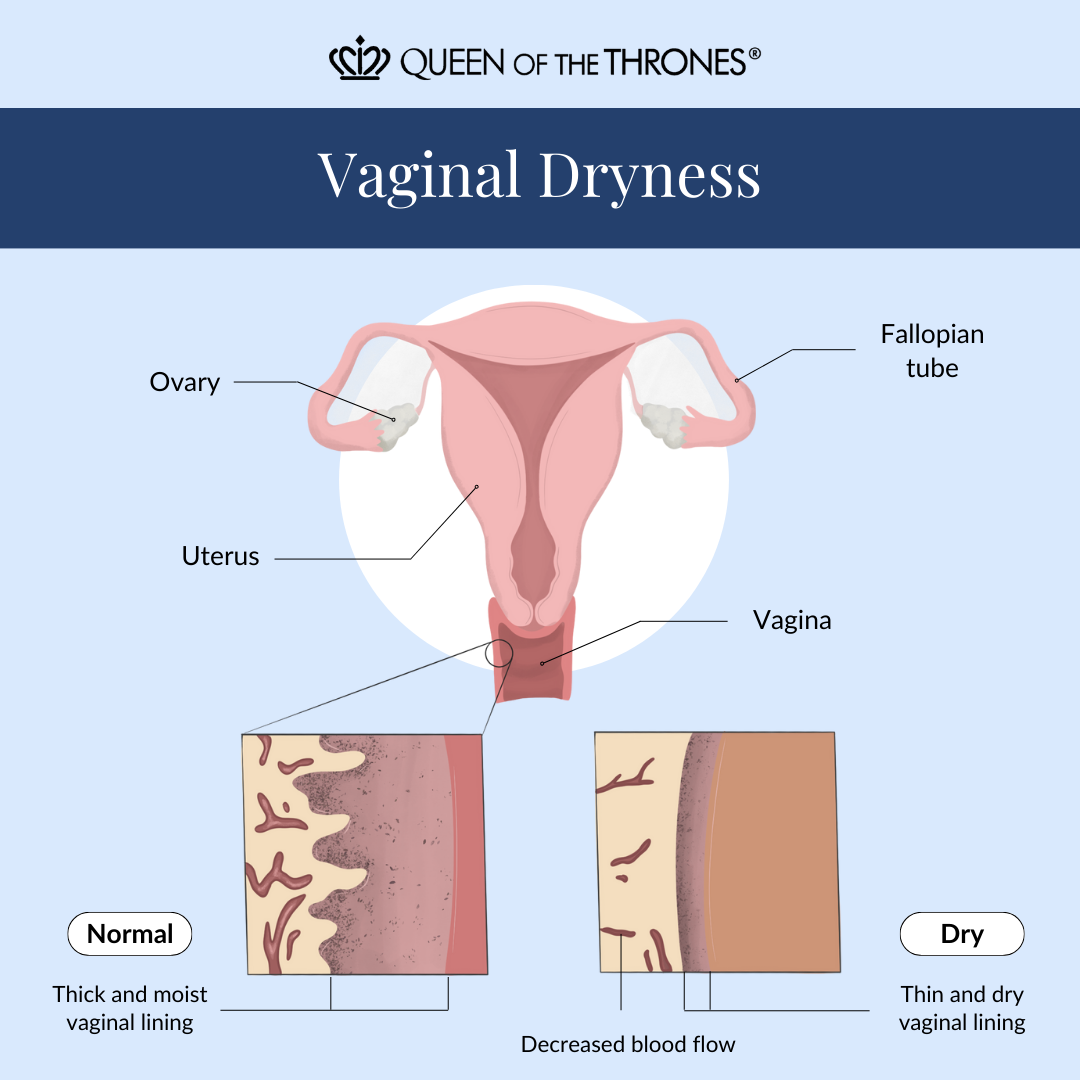
Unsurprisingly, this dryness can make things like intimacy with your partner uncomfortable- and that’s not even the whole story.
The emotional side of vaginal dryness is often overlooked. It’s not just a matter of physical discomfort; it’s about feeling out of touch with your own body, right? Plus, society doesn’t exactly shout about menopause, so it can often feel like a solo journey.
It’s a difficult phase to navigate, but it’s important to remember that every woman’s journey is different, and there’s no one-size-fits-all approach or solution. Embracing the changes is important, and ensuring good communication with your partner while navigating this dry spell will help to break the silence.
Natural ways to deal with menopause
From hot flashes to mood swings, the symptoms can be diverse, and many women are seeking holistic ways to manage this transition. Before jumping to modern medicine support, like hormone therapy, many women have found comfort in complementary and alternative medicine approaches, including yoga, and general exercise to help improve quality of life during menopause.7
Maintaining a healthy exercise routine can not only help support menopausal symptoms, but also helps to build a natural self-care routine that supports your overall wellbeing, including your mental wellness.
Another alternative and holistic approach to some of these uncomfortable side-effects of menopause is Castor Oil Packs.
Supporting menopausal wellness with Castor Oil Packs
Castor Oil Packs are an ancient wellness practice that has been reinvented to be less messy, easy to do and adaptable to your everyday life. Sounds good, agreed?
Queen of the Thrones® has designed Castor Oil Packs for nearly every part of your body, including the Pelvis & Hips Castor Oil Pack, which can make a wonderful natural support to help you through your hot flashes, bloating, indigestion, hormone balance and more!
Discovering natural ways to navigate menopausal symptoms can be empowering, agreed? While not a miracle cure, Castor Oil Packs are considered by some as a wellness practice that may provide support.
Here’s how they could contribute to your menopausal journey:
Comfort: Applying a Castor Oil Pack to the lower abdomen may offer a comforting warmth, providing a sense of relaxation and relief during moments of discomfort.
Relaxation: The process of applying the pack and taking a quiet moment for yourself might contribute to an overall sense of relaxation, which is beneficial for managing stress associated with menopausal symptoms.
Mindfulness: Engaging in a Castor Oil Pack routine may become a form of self-care, fostering mindfulness and connection with your body during this transformative phase.
Holistic wellness: When complemented with other doctor-recommended strategies, such as lifestyle adjustments and medical interventions, Castor Oil Packs become part of a holistic approach to menopausal well-being.
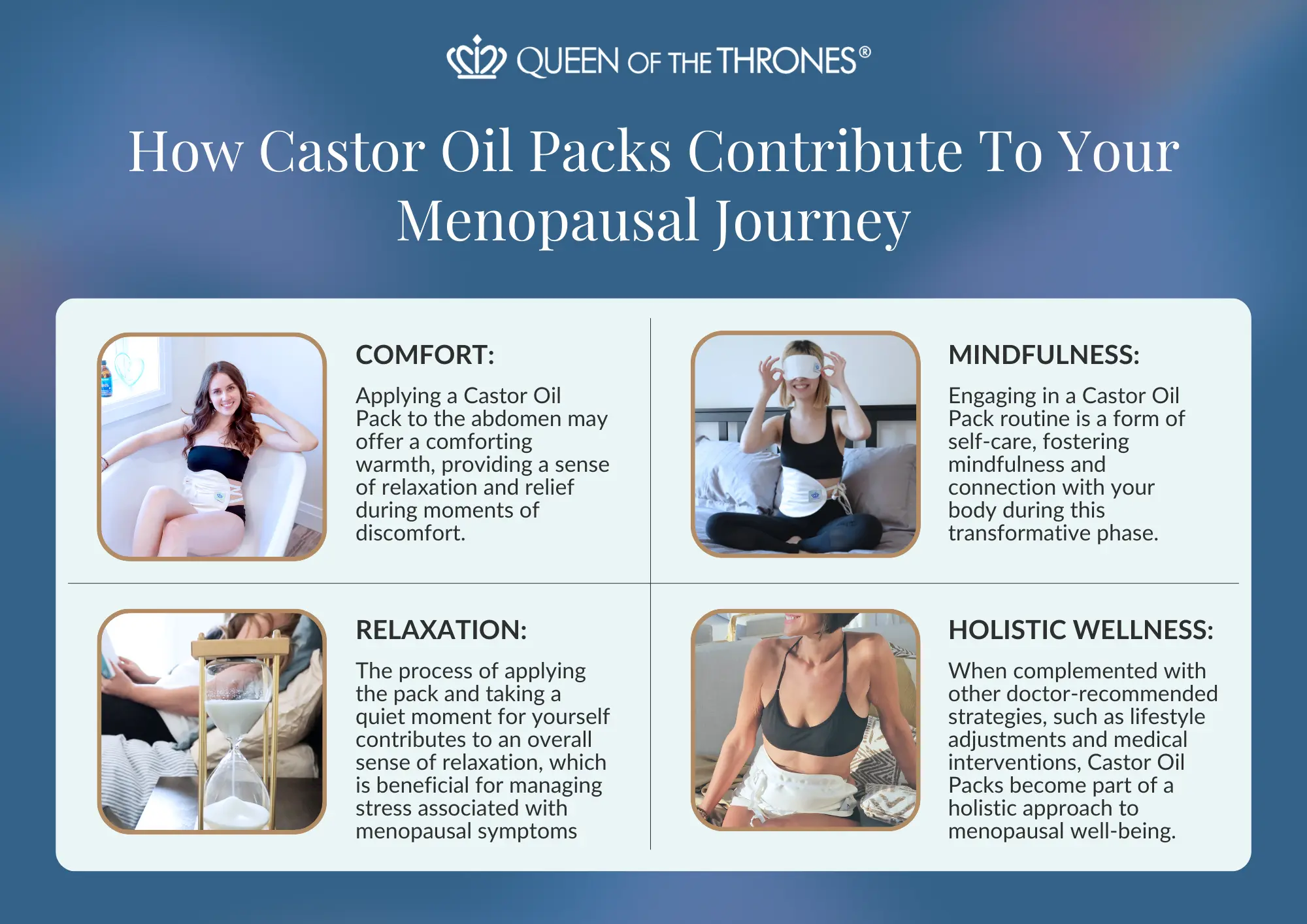
But, maybe you’re looking for further support beyond yoga, exercise and even your trusty Castor Oil Pack? Many women have turned to hormone replacement therapy to help support the uncomfortable symptoms of menopause.
Hormone replacement therapy
Hormone replacement therapy (HRT) is a way to replace hormones lost during menopause.
To ease menopausal symptoms, standard HRT uses estrogen and progesterone to mimic the hormones the ovaries used to produce. There are different types of estrogen therapies, like estradiol and estriol, as well as conjugated equine estrogen (CEE), which is the most commonly prescribed estrogen in the United States.
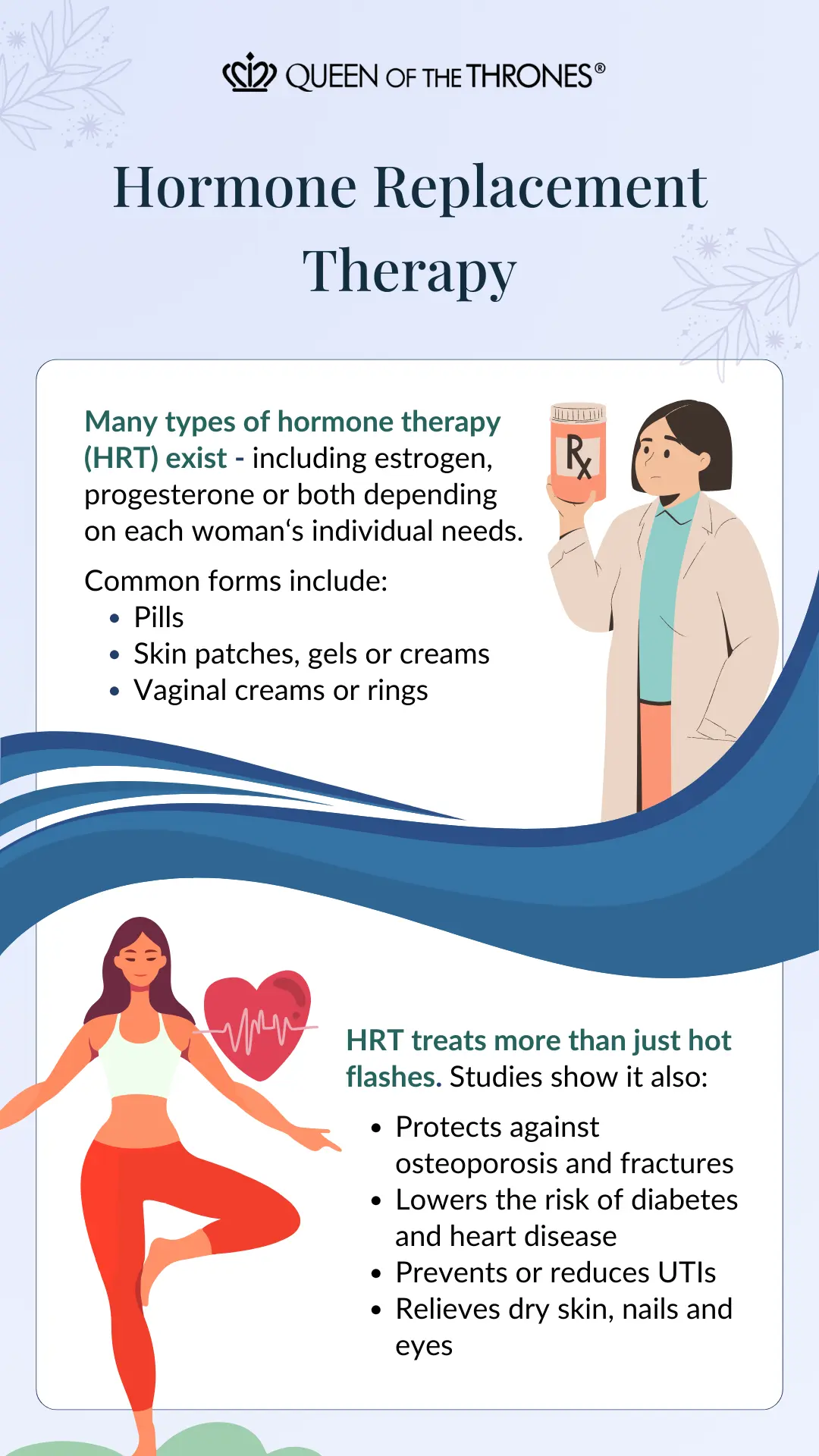
Estrogen therapy for menopause
More and more evidence shows that using estrogen therapy (ERT) can effectively treat symptoms that impact the quality of life during menopause10, helping women to begin feeling more in touch and connected with their body again.
Progesterone for menopause
The main job of progesterone in hormone therapy after menopause is to protect the endometrium (lining of the uterus). Using estrogen therapy (ET) alone without progesterone significantly raises the risk of endometrial hyperplasia and adenocarcinoma.11
Progesterone in menopausal hormone therapy plays a crucial role in keeping the endometrium safe. If you go for estrogen therapy (ET) alone, it significantly increases the risk of issues with the uterine lining. But, when you pair the right amount and duration of progestogen with ET, you can help lower that risk to levels seen in those who never use ET.
In combined therapy, the goal is to protect the endometrium while enjoying the benefits of estrogen and keeping progesterone-related side effects, like uterine bleeding, to a minimum.
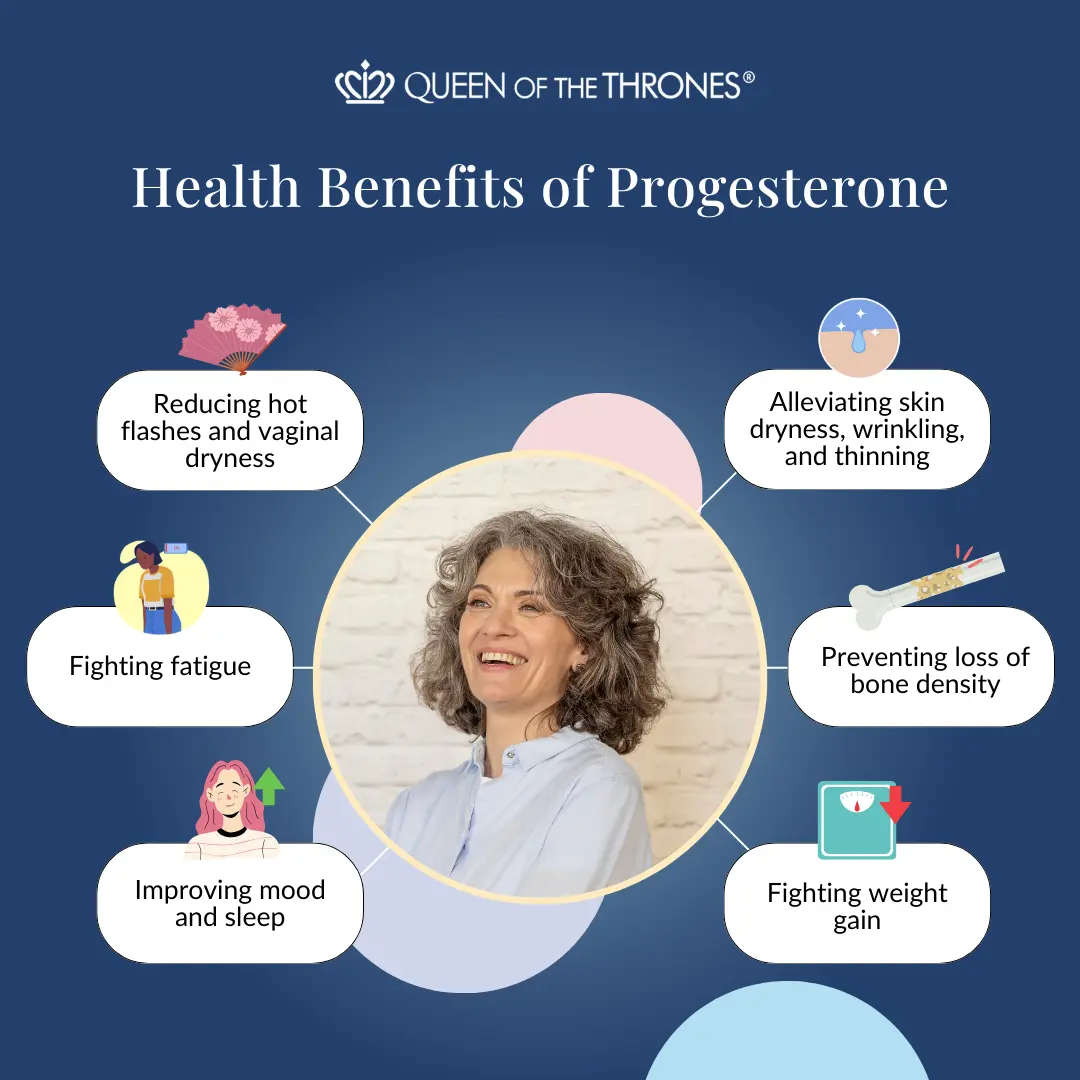
Any progesterone approved by the US Food and Drug Administration will do the job of protecting the endometrium if used in the right dose and duration.12
But, before you step into the world of hormone therapy replacement, perhaps you’re wondering what the signs are for you possibly needing this type of therapy?
What are the signs you need hormone replacement therapy?
Considering hormone replacement therapy (HRT)? Here are some key reasons you might want to explore it:
Hot Flashes: If you’re experiencing moderate to severe hot flashes and night sweats, systemic estrogen therapy may be helpful in providing relief.
Vaginal Symptoms: For those dealing with dryness, itching, burning, and discomfort during intercourse, estrogen may help alleviate vaginal symptoms associated with menopause.
Bone Health: Seeking to prevent bone loss or fractures? Systemic estrogen not only helps guard against osteoporosis but may be a valuable option if other treatments aren’t suitable or beneficial.
Early Menopause or Estrogen Deficiency: If you’ve had early menopause, surgical removal of ovaries before age 45, or primary ovarian insufficiency before age 40, estrogen therapy may reduce the risk of various health conditions such as osteoporosis, heart disease, stroke, dementia, and mood changes.
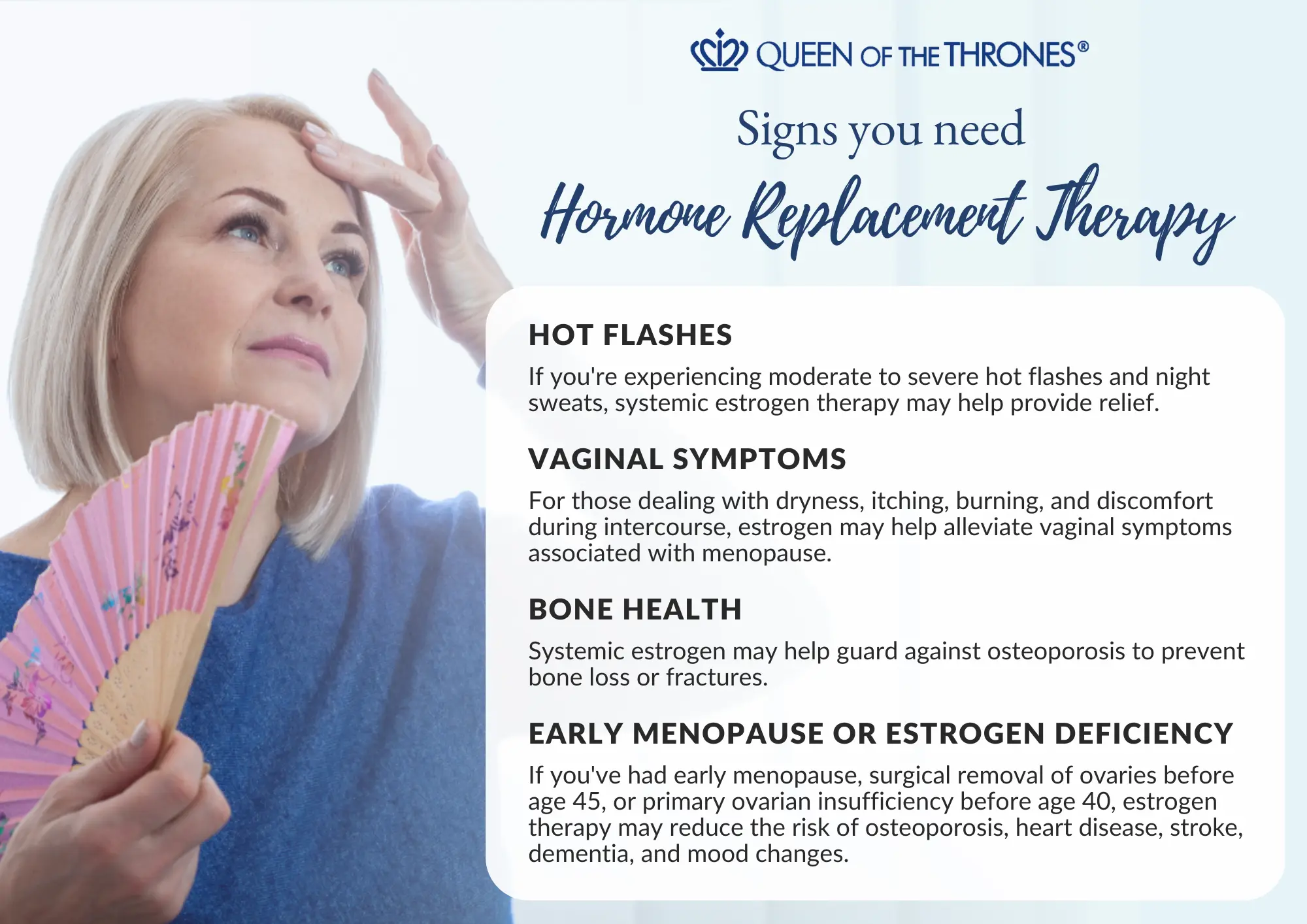
Conclusion
As women navigate the challenges of menopausal symptoms, seeking relief becomes an important pursuit. In this journey, Castor Oil Packs may offer a natural and comforting solution. Their simplicity and connection to ancient wellness traditions make them more than just a physical remedy; they become a gesture of self-care, reminding women that, in the quest for wellness, every small effort matters.
Alongside other doctor-recommended approaches, Castor Oil Packs harmonize well, blending natural remedies with medical wisdom. They don’t just help ease symptoms; they become a practice of self-love—a moment to pause, connect, and find solace.
Let’s unite in the pursuit of well-being, embracing the power of holistic approaches. In the soft glow of hope, let Castor Oil Packs, in sync with doctor-recommended strategies, be a source of comfort and resilience—a reminder that relief in the menopausal journey is within reach.
Are you a practitioner, health coach or wellness influencer? If you’re interested in recommending our easy-to-use tools and practically applying them in your health and wellness professional practice, in clinic, or online with the people you serve, you can join now!
Click here for references
- Santoro N, Randolph JF Jr. Reproductive hormones and the menopause transition. Obstet Gynecol Clin North Am. 2011 Sep;38(3):455-66. doi: 10.1016/j.ogc.2011.05.004. PMID: 21961713; PMCID: PMC3197715.
- Tarlatzis BC, Zepiridis L. Perimenopausal conception. Ann N Y Acad Sci. 2003 Nov;997:93-104. doi: 10.1196/annals.1290.011. PMID: 14644814.
- Carter AE, Merriam S. Menopause. Med Clin North Am. 2023 Mar;107(2):199-212. doi: 10.1016/j.mcna.2022.10.003. Epub 2022 Dec 27. PMID: 36759091.
- de Villiers TJ. Bone health and menopause: Osteoporosis prevention and treatment. Best Pract Res Clin Endocrinol Metab. 2023 May 9:101782. doi: 10.1016/j.beem.2023.101782. Epub ahead of print. PMID: 37230869.
- Peacock K, Ketvertis KM. Menopause. [Updated 2022 Aug 11]. In: StatPearls [Internet]. Treasure Island (FL): StatPearls Publishing; 2023 Jan-. Available from: https://www.ncbi.nlm.nih.gov/books/NBK507826/
- Goncharenko V, Bubnov R, Polivka J Jr, Zubor P, Biringer K, Bielik T, Kuhn W, Golubnitschaja O. Vaginal dryness: individualised patient profiles, risks and mitigating measures. EPMA J. 2019 Mar 2;10(1):73-79. doi: 10.1007/s13167-019-00164-3. PMID: 30984316; PMCID: PMC6459457.
- Nguyen TM, Do TTT, Tran TN, Kim JH. Exercise and Quality of Life in Women with Menopausal Symptoms: A Systematic Review and Meta-Analysis of Randomized Controlled Trials. Int J Environ Res Public Health. 2020 Sep 26;17(19):7049. doi: 10.3390/ijerph17197049. PMID: 32993147; PMCID: PMC7579592.
- Harper-Harrison G, Shanahan MM. Hormone Replacement Therapy. 2023 Feb 20. In: StatPearls [Internet]. Treasure Island (FL): StatPearls Publishing; 2023 Jan–. PMID: 29630243.
- Crandall CJ, Mehta JM, Manson JE. Management of Menopausal Symptoms: A Review. JAMA. 2023 Feb 7;329(5):405-420. doi: 10.1001/jama.2022.24140. PMID: 36749328.
- Freedman MA. Quality of life and menopause: the role of estrogen. J Womens Health (Larchmt). 2002 Oct;11(8):703-18. doi: 10.1089/15409990260363661. PMID: 12570037.
- Furness S, Roberts H, Marjoribanks J, Lethaby A. Hormone therapy in postmenopausal women and risk of endometrial hyperplasia. Cochrane Database Syst Rev. 2012 Aug 15;2012(8):CD000402. doi: 10.1002/14651858.CD000402.pub4. PMID: 22895916; PMCID: PMC7039145.
- North American Menopause Society. Role of progestogen in hormone therapy for postmenopausal women: position statement of The North American Menopause Society. Menopause. 2003 Mar-Apr;10(2):113-32. doi: 10.1097/00042192-200310020-00003. PMID: 12627037.

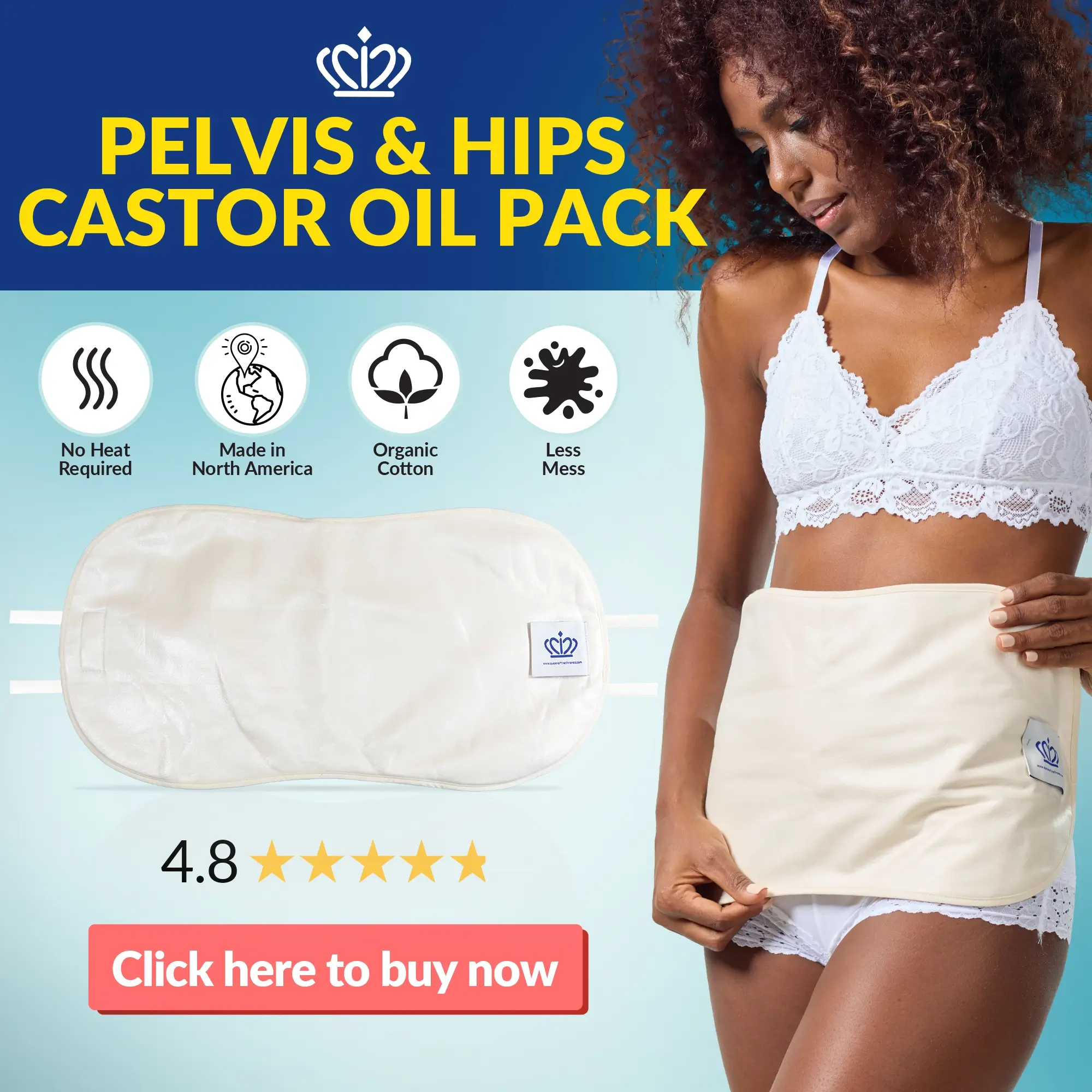


0 Comments